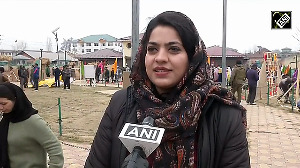A solution to the woes of indigent farmers in drought-hit Vidarbha region of Maharashtra might actually lie in cans of milk, believes the National Bank for Agriculture and Rural Development.
The bank, which conducted a study along with the National Dairy Development Board, feels that setting up dairy cooperatives modelled on Gujarat's 'Operation Flood' could ease agrarian distress and stop suicides by farmers in the region.
The two organisations have decided to create an institutional structure for collecting, processing and marketing milk in the region.
"A quick study by Nabard and NDDB has revealed that in some of the six districts, (milch) animals exist and what is required is institutional structures to collect and market milk," Nabard Chairman Y S P Thorat said.
Nabard and NDDB propose to create the formal linkages including processing on an urgent basis through a collaborative arrangement, costing about Rs 100 crore and action on the ground will be visible in the next one month.
"Suicides have seldom been in households which have subsidiary income," Thorat said, adding that the scope of animal husbandry would be expanded.
Currently, the majority of milk in the region is sourced from Kolhapur or Gujarat, which would be replaced by locally procured and sold milk.
Nabard Chief General Manager N Srinivasan told PTI that detailed planning was underway to broadbase the animal husbandry industry and villagers would be motivated to purchase new animals by offering credit facility through banks.
"We have to motivate people to take up the dairy business and develop a milk-van route and establish linkages with the dairies and chilling centres," Srinivasan said.
With an institutional structure in place, the cost of transport will be negated and all six districts of the region will be benefited, he said.
"The existing dairies and chilling centres are running below their capacities and hence need to be upscaled with more people taking up dairy business," he said.
Vidarbha, which is pre-dominantly a cotton growing region, will also undertake crop diversification to meet the requirements of animal fodder.
"Instead of cotton, which is a 160-day crop and takes up all the moisture, we propose one major crop (soya or tur) followed by a fodder crop for the cattle," he said.
Going ahead, NABARD will involve non-government organisations to educate people on veterinary care, animal breeding and rearing.
"In a couple of years we propose processing milk into products like milk powder, milk pouches, cheese or butter. But for the time being, liquid milk itself is a lucrative opportunity," he said.






 © 2025
© 2025